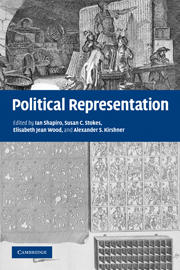Book contents
- Frontmatter
- Contents
- List of figures
- List of tables
- List of contributors
- Preface
- Editors' introduction
- Part I Representation before representative democracy
- Part II Theories of political representation
- Part III Representation and inherited injustice
- Part IV What role for representative quotas?
- Part V Preferences, persuasion, and democratic representation
- 10 Electoral representation and the aristocratic thesis
- 11 Why does the Republican Party win half the votes?
- 12 The impact of electoral debate on public opinions: an experimental investigation of the 2005 New York City mayoral election
- 13 Swing voters, core voters, and distributive politics
- Index
- References
12 - The impact of electoral debate on public opinions: an experimental investigation of the 2005 New York City mayoral election
Published online by Cambridge University Press: 05 June 2012
- Frontmatter
- Contents
- List of figures
- List of tables
- List of contributors
- Preface
- Editors' introduction
- Part I Representation before representative democracy
- Part II Theories of political representation
- Part III Representation and inherited injustice
- Part IV What role for representative quotas?
- Part V Preferences, persuasion, and democratic representation
- 10 Electoral representation and the aristocratic thesis
- 11 Why does the Republican Party win half the votes?
- 12 The impact of electoral debate on public opinions: an experimental investigation of the 2005 New York City mayoral election
- 13 Swing voters, core voters, and distributive politics
- Index
- References
Summary
Introduction
Political debates have long been a part of the American polity. The early practice was aimed primarily at promoting parliamentary and elite deliberation, as well as informing the broader public about issues and candidates (Jamieson and Birdsell 1988: 37). Televised debates have altered this dynamic, structuring debate as a practice to educate the electorate. Yet the impact of televised debates on the quality of democracy has been somewhat controversial, with proponents casting debates as opportunities “to provide sustained analysis of issues and close comparison of candidates” (ibid.: 5), and others expressing the concern that the televised debates would increase the emphasis on image rather than substance (Druckman 2003).
Whether debates influence opinions by showcasing candidate viewpoints or by simply presenting shallow cues of candidate image, conventional wisdom assumes that televised debates will somehow influence viewers' opinions regarding the candidates. Information in the electoral process is presumed to help voters make decisions more in line with their preferences (Lupia and McCubbins 1998). In light of the emphasis on the informative potential of debates, it is natural to pose the question of whether debates truly provide citizens with information that influences their opinions or choices.
To this end, there is a large literature examining the impact of debates on citizens' political opinions and voting behavior. This research has concluded that debates are able to alter viewers' opinions of candidates, but only in a small way.
- Type
- Chapter
- Information
- Political Representation , pp. 324 - 341Publisher: Cambridge University PressPrint publication year: 2010
References
- 2
- Cited by



